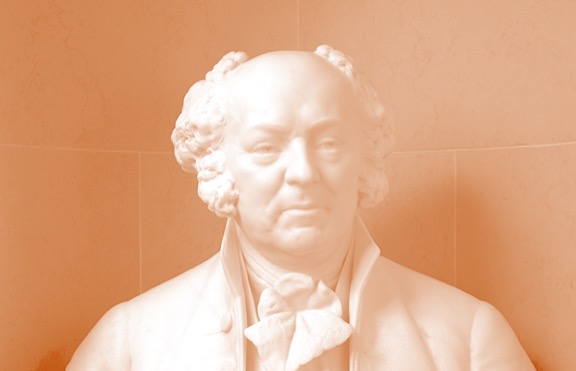Part II: Honor and self-constraint can stave off tyranny.
Founding Fathers and Red Caesar

Those who speak plainly about our regime’s decay are not the ones responsible for it.
If three things in life are inevitable, they are death, taxes, and bad-faith hit pieces against the Claremont Institute. The last of those things (well, maybe the others, too) seems to be occurring much more frequently nowadays.
The most recent screed from The Guardian’s Jason Wilson is a panicked warning about growing discussion on the Right of a “Red Caesar”—an extralegal ruler who, judging that the oligarchic ruling class has forfeited its legitimacy as a representative government, will take advantage of the chaos to impose order from the Right through autocratic means. It opens by quoting Hillsdale College professor Kevin Slack, who reports in his latest book that the “New Right now often discusses a Red Caesar, by which it means a leader whose post-Constitutional rule will restore the strength of his people.” (In the interest of full disclosure, I am an alumnus of the Claremont Institute’s Publius fellowship program and took several of Dr. Slack’s classes as a graduate student at Hillsdale College.)
But Slack did not invent the term “Red Caesar”—that was essayist and former Trump Administration official Michael Anton, who weighed the possibility that civic decay might bring us to the point in the cycle of regimes at which either a Red or a Blue Caesar, on the model of Augustus, could seize the reins of power. Wilson does not treat this argument in full—he presumably has no problem with a potential Blue Caesar. It’s the Red variety he fears, and so he condemns Slack for even accepting Anton’s premise: that a cronyist government has supplanted republican government by way of the administrative state and media apparatus. This assessment strikes Wilson as “conspiratorial and extreme”; to me it seems like a plain assessment of the facts.
Certainly, to observe that such conditions could facilitate the rise of a Red Caesar is not to welcome or invite that outcome. To the contrary, Anton and others are dismayed that the republic should have even arrived at the point at which the possibility can even be countenanced. But even to discuss the possibility of regime change (except regime change in a leftward direction) is enough to raise accusations of anti-Americanism.
In his typical hysterical fashion, Damon Linker warns that a Trump victory in 2024 will lead to martial law and soldiers in the streets. Such concerns ring hollow from those who supported the curtailment of civil liberties with Covid lockdowns and unconstitutional vaccine mandates and made excuses for or even cheered on rioters and looters in the summer and fall of 2020. But that aside, any serious political inquiry into our own times will necessarily raise questions over the stability of the current regime and what will succeed it.
Linker, who fancies himself as a student of Leo Strauss, should know that Strauss himself pointed to Caesarism as the likely alternative to a failed republic in his “Restatement on Xenophon’s Hiero.” The histrionics over theoretical discussions of Caesarism reveal a deeper epistemic fear that an objective approach to political science could lead one to doubt the viability or legitimacy of the status quo.
Red Caesar is not, à la Martin Heidegger, a plea for a god to save us. It is an acknowledgment that the independent, liberty-loving people who once constituted the ruling majority in America are dead and gone. Distressing as that is, it is a fact. Any sober observer who has not decided against the possibility in advance will acknowledge that rule by strongman is one eminently possible outcome of our current downward trajectory. But to say so is not to wish it so. As Slack pointed out in his response, all this talk about Red Caesar has been spurred by the fact that republican, constitutional government has already been eroded, if not entirely discarded.
The Most Miserable Habitation
Far from being anti-American autocrats, then, those on the Right who raise the possibility of a Red Caesar are working in the same intellectual tradition as our founding fathers, who recognized that a republic lacking virtue and the rule of law will not long endure. It will degenerate into some kind of despotism or debauched oligarchy. John Adams, perhaps the most astute student of political philosophy and history in his generation, recognized the possibility that a Caesar (Red, Blue, or otherwise) would arise from the ashes of a ruined republic.
Adams, the first vice president and second president of the United States, played an underappreciated role in the formulation of American constitutionalism. In addition to drafting the 1780 Massachusetts Constitution, the oldest operating constitution in the world, his 1776 pamphlet “Thoughts on Government” influenced multiple state constitutions and, by extension, the future Constitution of the United States.
Following Montesquieu, Adams argued that all governments are founded upon a dominant principle or passion in its people—fear, honor, or virtue. Most governments are founded upon fear and produce misery for mankind. It was the last of these, virtue, which made a republic the best form of government. A republic, said Adams, depends upon the virtue of the people and best preserves their safety and happiness.
He defines this mode of government as “an Empire of Laws, and not of men.” Only a moderate, courageous, just, and wise people will preserve their liberty and the rule of law against the temptation of vice and slavish devotion to an elite class. It was for this reason that Adams served as legal representative for the redcoats who fired on the mob in the 1770 Boston Massacre, even though he publicly opposed Parliament’s assaults on the rights of the colonists. A nation that descends into mob rule will never preserve a free government and may even willingly surrender its rights in exchange for momentary pleasures.
President Adams famously wrote in a letter to the Massachusetts state militia that “Our Constitution was made only for a moral and religious People. It is wholly inadequate to the government of any other.” No other statement from a founding father is quoted so frequently in defense of traditional Christian morality. But it raises an obvious and alarming question: What happens if that morality is not restored? Adams’ letter to the militia was no mere pep talk, but a prophecy about the likely future of an America without virtue.
Just before his famous line on the need for a moral people, Adams wrote: “We have no government armed with power capable of contending with human passions unbridled by morality and religion. Avarice, ambition, revenge or gallantry, would break the strongest cords of our Constitution as a whale goes through a net.” If Americans do not voluntarily restrain themselves through religion and morality, they will lose the protections of their Constitution. They will no doubt be restrained—but by a government whose animating passion has changed from virtue to fear. They will suffer a despotism of their own design.
Adams warns that a wayward, hypocritical foreign policy will be the canary in the coal mine. “But should the People of America,” he writes, “once become capable of that deep simulation towards one another and towards foreign nations, which assumes the language of justice and moderation while it is practicing iniquity and extravagance; and displays in the most captivating manner the charming pictures of candour frankness & sincerity while it is rioting in rapine and insolence: this country will be the most miserable habitation in the world.” What could better describe a government that claims to uphold the rules-based international order while it spies on its own citizens, elected officials, and allies, extrajudicially murders citizens and children abroad, sacrifices its own soldiers to maximize the intake of refugees (read: reliable future voters for the Democratic Party), and risks nuclear war to prop up foreign money launderers? Adams’ son may be heralded as a prophet for warning that America will lose her liberty if she goes abroad in search of monsters to destroy. But his father deserves some credit for the insight, too.
Adams’ forecasts grew even darker over time. He foresaw that decline might be inevitable. “Commerce, luxury, and avarice” he wrote to Benjamin Rush, “have destroyed every Republican Government.” Eventually the virtue of the people would give way to decadence. The nation would be a victim of its own success. Such a government might maintain the trappings of a republic: “it may still exist in form” but it “is lost in essence.” Once it succumbs to corruption and greed, it will never return to its free, republican way of life. As Adams later asked Thomas Jefferson, “Have you ever found in history one single example of a Nation thoroughly Corrupted—that was afterwards restored to Virtue—and without Virtue, there can be no political Liberty.”
From this degenerated republic, as Adams wrote in an earlier letter to Jefferson, an “artificial aristocracy” would form, built upon wealth, power, and “corruption in elections.” This artificial aristocracy (in reality, an oligarchy) will bilk the people for its own advantage. But it will not last forever. “The everlasting envies, jealousies, rivalries and quarrels among them, their cruel rapacities upon the poor ignorant people, their followers, compel these to set up Caesar, a demagogue to be a monarch and master, pour mettre chacun a Sa place [to put them in their place].” There you have it in black and white: a founding father ruminating on a future Caesar rising up to crush a sclerotic oligarchy. Who knew that the founders were MAGA extremists?
Observation Is Not Invocation
Propagandists for the ruling class will balk at claims that America is an oligarchy. After all, we still have elections. But what good are elections that are bought and paid for by billionaires and rigged by intelligence officials? And even when the disfavored candidate wins, the national security state assumes veto power over foreign policy, plots treason with our rivals, and labels his supporters as domestic terrorists. The all-too-candid Chuck Schumer gloated that the intelligence agencies have “six ways from Sunday” to strike at duly elected officials. Phony dossiers and military-led impeachment attempts are just two of them. Adams had their mark two centuries ago. An oligarchy that hides behind the corpse of democratic institutions is still an oligarchy.
Adams warned that a future Caesar will be cut from the same cloth as the oligarchs that he replaced. Yet this is precisely why oligarchic capture is such a grievous crisis: there may be no way back from it, and no way forward except Caesarism. Among exclusively bad options, the people may be left with no alternative except to mitigate the decay by hoping for an autocrat who at least militates for order rather than further chaos and recrimination—a Caesar rather than a Sulla.
Conservatives who speculate about the possibility of a Red Caesar are responding to a legitimacy crisis caused by our ruling class. They recognize that there is a cycle of regimes, that corrupted governments do not last forever, and that, unfortunately, virtuous republics do not magically reappear once lost. They are not anti-American. That title should be reserved for those who sell out to foreign rivals, prosecute citizens for self-defense, stock porn in libraries, retaliate against parents for speaking out at school board meetings, disbar lawyers for challenging election illegalities, and condemn the Betsy Ross flag as a terrorist symbol—those, in other words, who have created the conditions under which it even becomes plausible to worry about a Caesar in the first place. Those who speak plainly about those conditions are not wishing them upon us. They are already here.
America today is increasingly an empire not of laws but of corrupt men. Those who point this out are not conspiracy theorists or dangerous militants, as far-left outlets like The Guardian claim, but simply men with functioning eyes and ears. They have seen that impartial due process and morality, the twin pillars of the rule of law, have long been eroded. They are right to ask, as the most pessimistic of our founders once did, whether this nation can long maintain its liberty.
The American Mind presents a range of perspectives. Views are writers’ own and do not necessarily represent those of The Claremont Institute.
The American Mind is a publication of the Claremont Institute, a non-profit 501(c)(3) organization, dedicated to restoring the principles of the American Founding to their rightful, preeminent authority in our national life. Interested in supporting our work? Gifts to the Claremont Institute are tax-deductible.
An Age of Flux.
The dos and don’ts when talking to the New Right
Loving everyone equally means loving no one in particular.
The tech elite have joined forces with progressive visionaries to establish a model of America’s feudal future.
We must understand the political ideas, history, and culture of the Founders’ generation.






